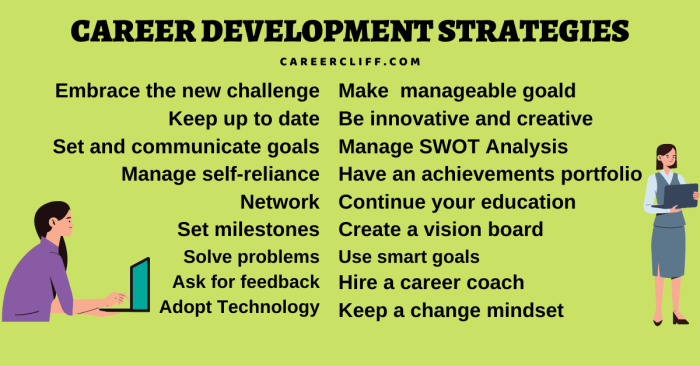Career Growth Strategies takes center stage, inviting you into a world of knowledge and success. Get ready to explore the key to unlocking your full potential in the professional realm.
Importance of Career Growth Strategies
Having a well-thought-out career growth strategy is crucial for professional development as it provides a roadmap for achieving long-term goals, helps in identifying areas for improvement, and allows for better decision-making in one’s career path.
Benefits of Effective Career Growth Strategies
- Clear Direction: Career growth strategies provide a clear direction for professionals, helping them stay focused on their goals and aspirations.
- Professional Development: By implementing effective strategies, individuals can continuously improve their skills, knowledge, and expertise, leading to overall professional development.
- Increased Opportunities: Strategic career planning opens up new opportunities for advancement, promotions, and career growth within an organization.
- Job Satisfaction: When individuals have a plan in place for their career growth, they are more likely to feel satisfied and fulfilled in their professional lives.
Examples of Successful Individuals
Elon Musk, the CEO of Tesla and SpaceX, is a prime example of someone who has leveraged strategic career planning for growth. His vision and strategic decisions have propelled him to success in the tech industry.
Oprah Winfrey, a media mogul, used strategic career planning to build her empire, focusing on personal development, networking, and seizing opportunities to achieve her goals.
Components of a Successful Career Growth Strategy

When it comes to developing a successful career growth strategy, there are several key components that individuals need to consider. These components are essential for setting clear goals and objectives to help guide their career progression.
Setting Clear Goals and Objectives, Career Growth Strategies
One of the most crucial components of a successful career growth strategy is setting clear and achievable goals. These goals should be specific, measurable, attainable, relevant, and time-bound (SMART). By defining clear objectives, individuals can focus their efforts on what they want to achieve and track their progress effectively.
- Create a career vision: Define where you want to be in your career in the long term.
- Set short-term goals: Break down your long-term vision into achievable short-term goals that you can work towards.
- Develop an action plan: Artikel the steps you need to take to reach your goals, including acquiring new skills, networking, or seeking mentorship.
- Regularly review and adjust: Continuously assess your progress and make necessary adjustments to stay on track towards your career objectives.
Taking Action to Develop Your Strategy
Developing a career growth strategy requires proactive steps that individuals can take to enhance their professional development and achieve their career goals.
- Invest in continuous learning: Pursue further education, attend workshops, or obtain certifications to stay relevant in your field.
- Build a strong network: Connect with professionals in your industry, attend networking events, and seek mentorship to gain valuable insights and opportunities.
- Seek feedback and mentorship: Actively seek feedback from supervisors, peers, or mentors to identify areas for improvement and grow professionally.
- Take on new challenges: Volunteer for projects outside your comfort zone to expand your skills and demonstrate your potential for growth.
Personal Development within Career Growth

Personal development initiatives play a crucial role in enhancing overall career growth. By focusing on improving skills, knowledge, and mindset, individuals can increase their value in the workplace and open up new opportunities for advancement.
Different Personal Development Approaches
- Continuous Learning: Actively seeking out opportunities to learn new skills and expand knowledge through courses, workshops, or certifications.
- Mentorship: Engaging with experienced professionals who can provide guidance, support, and insights to help navigate career challenges.
- Networking: Building relationships with industry peers, mentors, and leaders to gain new perspectives, exchange ideas, and explore potential career paths.
- Self-Reflection: Taking the time to assess strengths, weaknesses, goals, and values to align personal development efforts with career aspirations.
Real-Life Success Stories
“I started investing in personal development by attending leadership seminars and reading self-improvement books. This not only boosted my confidence but also helped me secure a promotion within a year.” – Sarah, Marketing Manager
“Through mentorship programs at my company, I was able to learn valuable insights from senior leaders, which guided me in making strategic career decisions and eventually led to a successful transition to a higher role.” – John, Sales Director
Overcoming Challenges in Career Growth: Career Growth Strategies
Facing challenges in career growth is a common experience for many individuals striving to advance in their professional lives. These obstacles can range from internal doubts and fears to external factors such as competition and changing industry trends. Overcoming these challenges requires resilience, adaptability, and a strategic approach to navigating the ups and downs of the career development journey.
Dealing with Self-doubt and Fear of Failure
One of the biggest challenges individuals face when pursuing career growth is dealing with self-doubt and the fear of failure. These negative thoughts can hold you back from taking risks and seizing opportunities that could lead to advancement in your career.
- Practice positive self-talk and affirmations to build confidence in your abilities.
- Set small, achievable goals to boost your self-esteem and track your progress.
- Seek mentorship or coaching to gain perspective and guidance on overcoming self-doubt.
Navigating Office Politics and Competition
In a competitive work environment, navigating office politics and dealing with competition can be challenging. Building strong relationships, maintaining professionalism, and focusing on your own growth are essential strategies to overcome these obstacles.
- Focus on building a strong network of allies and supporters within your organization.
- Avoid getting involved in office gossip or unnecessary conflicts that could derail your career growth.
- Stay focused on your goals and continue to develop your skills and expertise to stand out among competitors.
Adapting to Industry Changes and Technological Advancements
In today’s fast-paced work environment, staying relevant in the face of industry changes and technological advancements is crucial for career growth. Embracing lifelong learning and staying adaptable are key to overcoming these challenges.
- Stay informed about industry trends and developments through continuous education and networking.
- Upgrade your skills and knowledge through online courses, workshops, and certifications to stay competitive in your field.
- Be open to new opportunities and technologies that can enhance your career prospects and keep you ahead of the curve.
